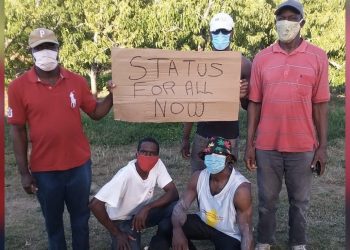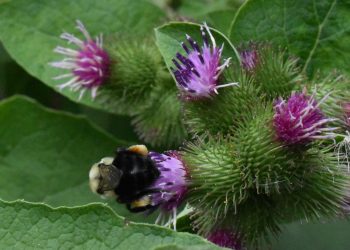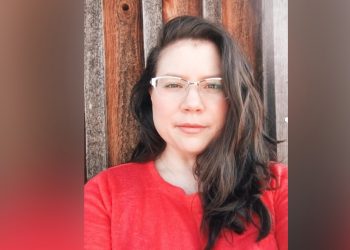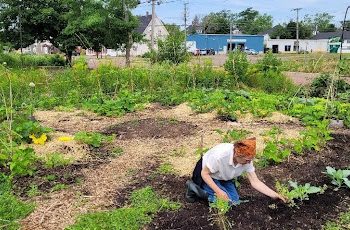The National Farmers Union (NFU) organized a full-day BIPOC (Black, Indigenous, and People of Color) farm workshop on April 1 at the Kennebecasis Valley Public Library in Quispamsis, as the first of four workshops happening across the country.
The second workshop took place in New Hamburg, Ontario in April. Saskatchewan and British Columbia will host the next two workshops.
Fourteen participants from across New Brunswick attended the Quispamsis event with nine self-identified as BIPOC and five as allies. Attendee Fatima Xelef prepared Kurdish-Syrian Halal food for the workshop lunch.
A land acknowledgement and smudging ceremony with locally-grown tobacco as well as cedar and sweet grass was offered by Sherry Thiessen, a Mohawk culture worker originally from the Six Nations community in Ontario. Thiessen is now involved in the urban gardening movement in Saint John. Small monetary gifts were then offered to the two nations, the Wolastoqey and the Mi’gmaq, along with an expressed commitment to reconciliation and solidarity with the original stewards of the land here.
“I thank you and praise you, for performing the ceremony for us, for calling us to go back to the land, to Mother Earth,” said Habib Klisli who sells produce from his backyard organic stand in Saint John. Klisli, a native of Turkey encouraged everyone to grow at least some of their own food, citing the abundance from his own urban garden.
The opening session explored two major crises concerning both the climate and the current state of farming. After a presentation by Data Brainanta, the BIPOC President of the National Farmers Union in NB, particpants discussed how the role of ecological, low-input farming practices could simultaneously address these issues.
Participants then deliberated on Indigenous agriculture, agroecology and food sovereignty as important concepts to holistically improve our food system and challenge corporate control of food production and supply chain management. Louis-Xavier Aubin, a member of the Wolastoqey nation who teaches at Kehkimin Wolastoqey Immersion School in Fredericton, pointed out the lack of land available for Indigenous people to produce food.
Access to land, local community support and government assistance are some obstacles to farming identified by BIPOC participants. “Systematically, we must realize that we (BIPOC) are the most victimized by nutrition” commented Baba Shabazz, a Black self-proclaimed culture-farmer from the Kingston Peninsula.
Phil Savage, an artist and farmer from Savage Gardens family farm, shared his experience and struggle in flower and vegetable production, reflecting the real-life challenges of farm operation such as social-media marketing, debt and high workload.
For migrant workers employed in New Brunswick, Niger Saravia, a migrant advocacy worker with Migrant Worker Alliance for Change from El Salvador who currently lives in the Miramichi area said, “For migrant workers the first step is to get permanent resident status which will give them the possibility to access land. For those who want to get into farming, there is practically no supporting infrastructure to be able to grow their own food and do farming.”
For Mujin Lee, an aspiring young farmer who was born in South Korea and grew up in the Quispamsis area, his main concern is the lack of secured employment in agriculture. “I could not find any full-time farming job,” he said.
Gillian Cormier, NFU staff person and associate member, presented an overview of the NFU’s history and present-day work, both provincially and nationally. She highlighted the NFU’s voice in issues such as supply management, potash mining and gave examples of initiatives that promote food sovereignty like the NB Farmers Market Map.
“The NFU in NB is one of two accredited general farm organizations in the province. The NFU is a member-led organization that takes pride in taking no corporate funding; this enables the organization to speak out free from corporate interest but rather in alignment with the principles of food sovereignty,” Cormier says.
Cormier explained the various ways people can become members of the NFU, “farmers can be a member of the NFU in NB through Farm Business Registration. There are also direct membership options for farmworkers and associates (allies).”
Participants shared commonality in their stewardship of the land. The workshop made clear the necessity to combine efforts against a culture of individuality and advocate together for political and culturally-sound practices enabling food and farming systems to become locally entrenched and to thrive.
The National Farmers Union is a direct-membership voluntary organization formed in 1969 made up of Canadian farm families, farm units, farmworkers and associate members. The NFU BIPOC Caucus was formally established in 2021 at the NFU Convention, held online by a historic constitutional amendment. The NFU has BIPOC leadership nationally (BIPOC President and Vice President) and regional/provincial BIPOC presidents locally.
Peggy WoolZ researches settler/Indigenous history through the three eyes of artist, witness and archivist. She lives in Quispamsis, New Brunswick.







![Is pollution from industry causing the neurological disease ALS in New Brunswick? [video]](https://nbmediacoop.org/wp-content/uploads/2025/10/Quintin-Soloviev-Belledune_Generating_Station_in_New_Brunswick_Canada-120x86.jpg)


